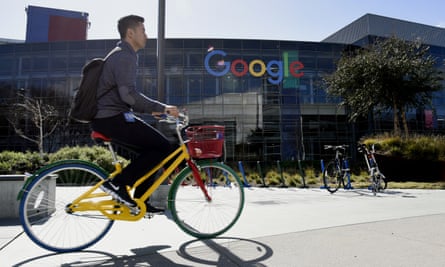Qichen Zhang couldn’t believe what she was hearing. The technical specialist was in the middle of the office at Google when a white male colleague began joking with her about her hiring.
“He said, ‘It must’ve been really easy for you to get your job because you’re an Asian woman and people assume you’re good at math,’” Zhang recalled in a recent interview. “It was absolutely stunning. I remember me just emotionally shutting down.”
The conversation was one of many instances where Zhang said she felt isolated as a woman of color working for the technology giant, and a few months later, feeling like there was no future for her at Google, she quit.
“I didn’t see a lot of women, especially Asian women, black women or other women of color in the executive ranks,” she said. “I didn’t see any opportunities for myself … The culture there is really discouraging, and that’s ultimately why I left.”
Zhang spoke with the Guardian days after a white male engineer at Google sparked an international uproar with a memo criticizing diversity initiatives, arguing that white men are victims of discrimination and that women are underrepresented in tech because they are biologically less suited to engineering and leadership positions.
More women have since come forward with stories of sexism at Google, and now, people of color are sharing accounts of racial discrimination at the corporation, which has a predominantly white and male workforce, much like the rest of Silicon Valley.
Despite Google’s notoriously strict confidentiality policies, which some say are used to intimidate and silence critics, several former and current employees spoke in interviews about the ways in which they believe minorities, particularly women of color, are denied opportunities and equal pay. They described a culture that tolerates racism and sexism, where white male managers frequently support and promote employees who look like themselves.
“Google is seen as the pinnacle … a cultural beacon for a lot of people in the tech industry. People really try to emulate Google,” said Zhang, 27, who now works at Spotify. “The fact that the bar is so low really sets an example for the rest of the industry.”
‘I didn’t belong’
Concerns about discrimination at Google have escalated this year following the US Department of Labor’s allegations that women across the company are paid less than men for similar work, in violation of federal law. Google has vehemently denied that it underpays women.
The recent memo – which argued that women’s high rates of “neuroticism” and “agreeableness” make them less qualified for tech jobs – has further exposed a mentality that some say is common among conservative white men in tech who believe affirmative action and gender equality initiatives are bad for businesses (despite research showing the opposite).
James Damore, the author, was fired, turning him into an overnight hero to the “alt-right”.
Quick GuideWhat is the 'alt-right'?
Show

Who coined the term 'alt-right'?
The white supremacist Richard Spencer devised the term in 2010. He has described the movement as "identity politics for white Americans and for Europeans around the world".
What does it stand for?
The movement supports extreme rightwing ideologies, including white nationalism – used interchangeably with white supremacism – and antisemitism. It positions itself broadly against egalitarianism, democracy, universalism and multiculturalism.
Some "alt-right" supporters have argued that their hardline, extremist positions are not truly meant, but are a way to disrupt conventional and accepted thinking. Memes, irony and ambiguity are sometimes used in an attempt to wrongfoot critics.
How does the 'alt-right' relate to the Trump administration?
The Trump administration includes figures who are associated with the "alt-right", including the former Breitbart News executive chairman Steve Bannon, who worked as chief strategist in Trump's White House in 2017. Many of Trump's policy positions have won favour with the movement.
At Google, men occupy 80% of tech jobs and 75% of leadership roles, according to the company’s own figures. Overall, only 2% of employees are black, 4% are Hispanic, 35% Asian and 56% white. The company has touted its recent 1% increases in a number of underrepresented groups.
Asked about the slow pace of progress, Yolanda Mangolini, Google’s director of global diversity and inclusion, said in an interview that “change takes time”, adding: “We know that it’s not just about recruiting a diverse workforce. It’s about creating an environment where they want to stay.”
One black woman who worked as a specialist at Google for several years told the Guardian that discrimination and prejudice impacted her job on a daily basis.
“I felt like I didn’t belong nor did anybody want me to belong,” said the woman, who requested anonymity for fear of retaliation by Google.
The former employee, who said she was the only black woman on her team, noted that employees would frequently ask to see her identification throughout the Google campus while non-black workers were rarely questioned.

She said she also overheard racist jokes on multiple occasions and that she immediately felt left out at the workplace – excluded from emails and social events and working alongside colleagues who didn’t bother to learn her name.
The woman said that her efforts to advocate for diversity further took a toll on her. The company seemed primarily interested in PR and positive branding when it came to diversity initiatives, which made it difficult to push for more substantive reforms.
She felt she was negatively judged for her advocacy for people of color: “They didn’t like the way you’re prioritizing diversity, because that’s not your role.”
The woman said that her time serving on a hiring committee was particularly disheartening. Committees of mostly white hiring managers would complain that a candidate lacked “Googliness”, meaning they believed an applicant might not be a good match for the company culture, she said. “It seems like we are interviewing people to fit in with white people, and not to interview everyone to make sure they are culturally competent.”
“When you speak up, you’re going to be negatively impacted,” she said. “It was almost like you had to compromise on your values and morals.”
People had this concept of ‘racism doesn’t exist at Google’
Zhang, a Harvard graduate, said she was thrilled to get a job at Google in 2013, noting that she loved the “don’t be evil” motto and its reputation as a “politically progressive” company “using technology to improve the world”, she said. “Everybody wants to work at Google.”
While initially enamored, she quickly felt “disposable” and unappreciated as a specialist who was not an engineer – a feeling made worse by the fact that most engineers and their managers were men. She recalled one meeting where she said she was the only woman, surrounded by white male engineers, who excluded her from the discussion.
“It’s just these little daily aggressions that really add up over time,” she said.“Having a lack of people who look like you in general is demoralizing.”
The culture at Google promoted the idea of the “meritocracy”, meaning discrimination is no longer a problem and that women struggling to get promotions should simply work harder and advocate more loudly, said Zhang.
“People had this broad concept of ‘racism doesn’t exist at Google and sexism doesn’t exist at Google’,” she said. “Just because your officemates aren’t saying racial slurs out loud doesn’t mean they’re not racist.”
Zhang added: “They care about getting good press, but they don’t actually want to put in the work to understand racism and sexism.”

Lakshmi Parthasarathy, who started at Google as a specialist in 2014 and was later promoted to technical solutions engineer, said she lacked female mentors and managers.
Parthasarathy, 26, emphasized that she liked everyone on her team and has remained friends with them since quitting earlier this year, but added: “You’re the only girl in the room all the time … Google has resources and I think they make efforts in some ways. But there’s only so much they can do when at the end of the day our organization was, at a manager level, mostly male.”
She said she rarely met women over the age of 30 in technical positions at the company: “It’s difficult for women to see paths for themselves at Google or in tech.”
Although she felt supported, she said she wished there was more transparency in the promotion process and salaries, and noted that for some women, Google can feel like a “boys’ club” with a “culture of guys promoting guys”.
Parthasarathy said she was also angry to hear this year that a male co-worker appeared to have received a more valuable stock package than her for reasons that were unclear.
Mekka Okereke, a black technical manager for Google Play, said he has one of the most diverse engineering teams in the company – 10% black, 10% Latino, 25% women and 50% female managers. The team, he said, has worked on building fairer hiring processes that proactively eliminate biases.
“It is possible to build inclusive teams and ... most managers are starved for information about how to actually go about doing that,” said Okereke, who was made available for an interview by Google’s communications department. “This is something we’re scaling across the company, and it’s working.”
‘You always have to prove yourself’
Zhang, who quit in 2014, said she felt that raising concerns to human resources about the racist joke she faced would be pointless, especially since the colleague was an engineer and she was not. (Reached for comment, the former co-worker said he did not recall making the remark).

“I don’t want to be labeled as the girl who cries ‘race card’ or plays the ‘woman card,’” she added. “I was just trying to get over it.”
After reviewing the Guardian’s summary of the women’s claims, Mangolini said: “I’m always disappointed when I hear these stories.” She pointed to Google’s “employee resource groups”, such as the “black Googler network”, which she said can go a long way in helping minorities who feel isolated find support and make connections.
Google, she said, has also made huge strides in its efforts to move away from subjective measures in hiring, performance reviews and promotions by focusing on rubrics with objective metrics.
Mangolini declined to discuss the pay gap claims and Google’s response to the Damore memo.
“It saddened me personally when I read it, because I knew the impact of those words on the technical women … [whose] skills are always questioned,” Mangolini said. “My heart sort of broke for them.”
Parthasarathy said she was frustrated by the argument that affirmative action helps unqualified minorities get hired: “People do think it’s easier for me to get into my job … There’s this feeling all the time whenever I do a project, you always have to prove yourself, and that really sucks.”
The black woman who worked as a specialist at Google said her experiences with discrimination took a severe toll on her mental health.
“There were times I cried at my desk,” she said, adding that she ultimately decided it wasn’t worth the trouble to stay at Google and began looking for jobs outside of the company, not caring that she would be earning a lower salary.
At Google, she added, “I was invisible. It was like I didn’t matter. So what was the point of being there?”
Email the author: sam.levin@theguardian.com
